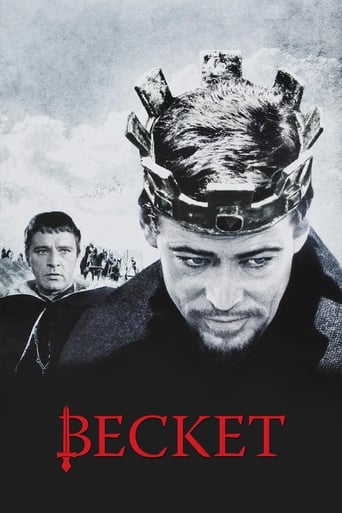cinemajesty
"Becket", Peter Glenville's film interpretation of Jean Anoulih's stage play released spring 1964 lives from his star-vehicle main characters portrayed by Richard Burton and Peter O'Toole, given Henry II of England a face for an anamorphic cinema-scope canvas.Henry II. arrives on Canterbury church sight, the year approximately 1066. The ambiance shows power of the clergy, here monks in brown robes, towards the English Throne. A flashback rolls out, revealing Becket & The King as brothers in crime. They are on rampage tour through the English landscape drunk and excited. The king seduces a peasant girl and steals her virginity. Despite Henry II, Becket loves living and respects life itself. The film unfolds the idea of life through two contradicting actors performing their version of each one's character.Burton and O'Toole are the real treasures of the picture with a oil-paint canvas like cinematography, minimal invasive camera movement and the occasional low-angle work. The ring with the great seal of England is given to Becket by the King, who snappy completes "Don't lose it or we need all move back to the Normandy." Peter O'Toole performs Henry II. as a playboy with will and focus. His character battles the members of the church for money in demanding risen taxes to fight the French. The king gives away a peasent girl in his own right as in-official slave trader to Becket, followed by a major feasting in the castle's main hall with a food & drink overload concluding in maximum vast before Henry II realizes Becket as a deacon at his side.At running time mark 52mins 00sec (PAL version) the King makes Becket the Arch-Bishop of England, leading to a power ascension within his kingdom, pointing out to Becket: "The Dye is cast. Make the most of it", not realizing that he cast off a life-threatening battle between King & Arch-Bishop, which becomes the main theme of "Becket". Richard Burton's character goes through a transformation from the King's friend / servant to head of the clergy. Nevertheless he must confess to been weak and self-indulging by seeking only his own benefit and personal pleasure. When at running time mark 01h 09mins 00sec, Richard Burton performs the prayer for his earthly sins, Peter Glenville's adaptation of "Becket" arrives in full bloom of non-stop conflicting between two powerhouse performers.Peter O'Toole's interpretation of Henry II shows constant temper, charging his power from food & drink infusion. The women pampered and stuck in the castle's chambers are the only ones who dare to distort and controvert the king. Right before the Intermission break at 1h 19min. 00sec., an ominous Lord Gilbert gets ex-communicated by Arch-Bishop Becket, which initiates the twist from friendship to battling each other to the death. Henry II schemes to accuse Becket of treacherous embezzlement regarding the King's savings. In return Becket accuses Henry II to be a Libertine. Becket in fully-charged of pride curses Henry II to become ex-communicated and an outcast.A revenge theme sets in over the battle of institutions. In return Henry II summons Becket to the court of law, declaring Becket an enemy to the crone. Director Peter Glenville handles the pinball game between the main characters with utmost precision with lacking continuously digging deeper into the King's psyche with character punch lines as "I don't like my children" as the King states to his wife. Nevertheless Henry II thanks his mother for given birth to him and correcting his wife of being absent at his physical side in which he learns to rule alone. Richard Burton's character counter-strikes with "I will be judged by the pope alone", in which he declares Total War to the English crone.Under the tightening noose, Becket has no choice accepting the pope's suggestion to do Monastry work, taking the easy way out in a life as monk in almost luxury manner before he is allowed to return to England under amour by the French King Louis VII, ingeniously performed by John Gielgud as a lively gay character. Goeffrey Unsworth plain, stage-like cinematography stays uneventful. All the film's power lies in the hands of the actors Richard Burton & Peter O'Toole, whose on screen chemistry comes to catharsis in an EXT. scene on a beach at Dover's.The quintessence of the King's character evolution takes shape that people kill what they love most, out of fear of losing it or to be touched by it physically as well as spiritually. So Henry II sends his knights to murder drunken Becket on holy grounds at Canterbury. The arch-bishop summons his dying day as Black World, getting dressed with red under-gown covered in white and gold. The servant, who presents Becket with a silver cross before taking the knight's with stab, trying to protect the arch-bishop. Becket on his knees, giving no resistance towards the King's knights. He gets slashed into pieces.Flashing forward to opening sequence, Henry II receives whiplashes by monks to eternity in front of Becket's grave, seeking redemption of a murdering his only friend. Again the cinematography in lighting and camera movement presents itself insufficient to prevail a test of time. The film concludes with Becket declared saint, revealing the the rotten desolated state of the world, but at least it pacifies the mob. The King leaves Canterbury as he came. The end.© 2017 Felix Alexander Dausend
avik-basu1889
Let's start this review by addressing the fact that my opinions will only be based on the script of this film and not on its historical accuracy. I have come across some other reviews saying that the screenplay writers and the director has taken a lot of artistic liberty and the occurrences in the film are not historically accurate. But I will only judge the film in a standalone manner without going into actual historical facts.Becket is a grand, period-costume drama based on the friendship between King Henry II of England and his close Saxon friend Thomas Becket. They both belong to different races, Henry II being a Norman and Becket being a Saxon. This friendship gets sneered at by other members of both the races. Henry decides to appoint Becket as the Archbishop of Canterbury to do away with all the altercations he had with the previous Archbishops by expecting Becket to always be by his side. But things don't work out that way. The film has absolutely brilliant cinematography and art-design. The halls, the mansions, the extravagant buildings look absolutely fascinating. The larger than life surroundings make the characters look so small giving the impression that these are normal people caught in the middle of larger than life circumstances that force them to act in specific manners. The film won't be the same without two absolutely brilliant performances from Peter O'Toole and Richard Burton. O'Toole and Burton beautifully complement each other. O'Toole is the loud, vocally aggressive and abrasive Henry who only found solace in the company of Becket, while Burton is restrained, sharp and mild mannered as Becket. While in the film, it is clearly apparent that Henry loved Becket as a friend, it is a matter of conjecture whether Becket considered Henry II to be his friend or not. But personally I think he did. I think Becket as a young boy was much like Brother John, a naive hot headed individual who sought justice. But gradually he learned the ways of the world and did things which were essential for his survival and the genuine friendship he shared with Henry gradually strayed him away from his principles. But his meeting with Brother John and his duty to defend God's Honor after being made the Archbishop made him recapitulate and remember the ideals that he once stood for and that made him go against Henry. Henry's subsequent anger I thought was mainly because of his jealousy towards God. He opined that Becket, his one true friend had chosen God over him and this made him go mad and it was fascinating watching O'Toole's performance while Henry gets eaten away by this jealousy, yet not forgetting his affection for his dear old friend all through.The script is rich both thematically and visually. It deals with racism, misogyny, British medieval history, God and religion and it also has very apparent homo-erotic undertones. But I still don't think that the script is without a few blemishes. Sometimes it lacks a bit of subtlety with people blatantly saying what they are thinking and one major transition that happens in the film felt a bit rushed to me. I thought that transition could have been allowed to happen without it having to be so sudden and it could have been handled a bit better with a bit more care. But having said that, considering the epic nature of the script, I think the director Peter Glenville did well to still make a film that is personal and a film that is about the characters and not the costumes.
evanston_dad
A very solid, engaging historical costume drama about Henry II (Peter O'Toole) and his friendship with Thomas Becket (Richard Burton), a man who Henry assumed would be his tool but who instead imposed his own principles against the king's wishes and died for it.It seems that since its release in 1964, this film has been raked over the coals for its historical inaccuracy. To which I say, anyone turning to a Hollywood version of history for facts deserves what he gets. Instead, it takes the historical premise and makes a juicy character study of it. Burton and O'Toole are in top form, and watching them butt stubborn head against stubborn head for two hours is entertaining enough to make up for any bad grade assigned to the film for its factual flaws. O'Toole especially is tremendous, giving an endlessly fascinating performance as a king who's perfectly capable of deeply loving a friend even as he calls for that friend's destruction."Becket" is the sort of respectable prestige film made to win Academy Awards, and though it won only one in 1964, for Best Adapted Screenplay (Edward Anhalt), it was nominated for 11 others, tying the nomination tally of that year's best picture winner, "My Fair Lady." Its nominations included Best Picture (Hal B. Wallis), Best Director (Peter Glenville), Best Actor (Richard Burton), Best Actor (Peter O'Toole), Best Supporting Actor (John Gielgud, for what feels like about two minutes of screen time), Best Art Direction, Best Cinematography, Best Costume Design, Best Film Editing, Best Original Score and Best Sound.Of course, 1964 is the year of "Dr. Strangelove," which blows both "Becket" and "My Fair Lady" out of the water, and which predictably won 0 Academy Awards.Grade: A
Bill Kalenborn
As so many other reviewers have noted, this is one of the finest films ever made. You may note the many long theatrical takes, and the limited cutting that allows you to watch the simultaneous acting of both the speaker and the auditor to the speeches. I see that some reviewers have lamented the shape of the prints that they have seen. I am delighted to report that the DVD is utterly sparkling, claimed on the disc to be better than the new screen version in 1964. Both the leads were nominated for best actor, and either could have won. I assume they split the vote to allow Rex Harrison in. A few have noted that Lawrence Olivier played Becket to Anthony Quinn's Henry. But I haven't noted any who have mentioned that Peter O'Toole was to have played it on the stage, but passed it over for Lawrence of Arabia. Nor have they mentioned that later Olivier and Quinn alternated roles. That would have been bloody marvelous to see.








